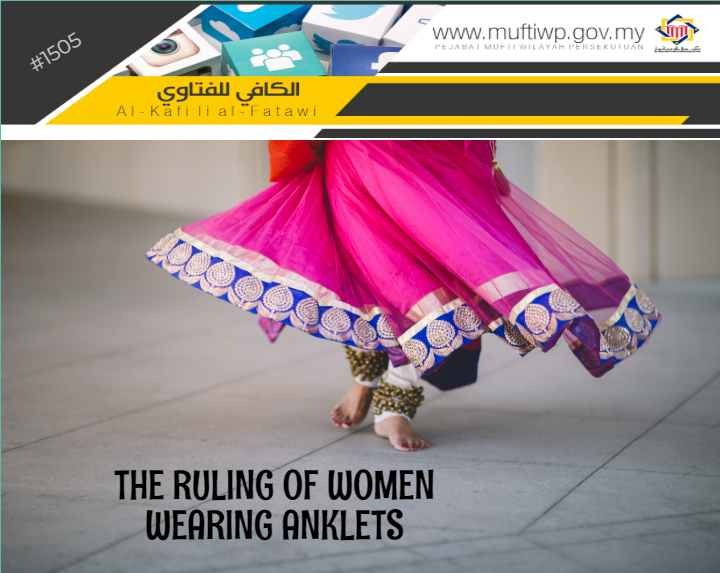Question:
Assalamualaikum Dato’. My wife wants to wear anklets. The ruling of wearing anklets in Islam is haram, isn’t it? I hope Dato’ may explain this. I am still confused. Thank you.
Answer:
Alhamdulillah, praise and thanks to Allah for the countless blessings He has blessed us all with. Blessings and salutations to the Prophet Muhammad PBUH, his wives, his family, companions and all those that follow his teachings to the day of judgement.
Ornaments
Ornament is originally permissible (to be worn) when there is no dalil which prohibits it like excessiveness, extravagance and cause fitnah. Syeikh Sadiq Hassan al-Qinnauji cited from Abu Sa’ud, stating, “Indeed, every ornament is permissible except when there is dalil (which prohibits it)”. (See fathul al-Bayan fi Maqasid al-Quran 4/335).
Allah SWT says:
يَا بَنِي آدَمَ خُذُوا زِينَتَكُمْ عِندَ كُلِّ مَسْجِدٍ وَكُلُوا وَاشْرَبُوا وَلَا تُسْرِفُوا ۚ إِنَّهُ لَا يُحِبُّ الْمُسْرِفِينَ
O children of Adam, take your adornment at every masjid, and eat and drink, but be not excessive. Indeed, He likes not those who commit excess.
Surah al-A’raf (31)
Syeikh al-Sa’di states in his tafsir, what is meant by the above verse is the commandment of covering awrah during prayer. Hence, covering of any ornaments at the body. And the verse includes wearing clean and good clothes, commandment of covering awrah and use of ornaments for beauty. (See Taisir al-karim al-Rahman fi Tafsir kalam al-Mannan, 1/287)
Wearing Anklets
Pertaining to ornaments by wearing anklets for women, Allah SWT forbids the women from stamping their feet for the anklets to produce sound and attracting the men. Allah SWT says:
وَلَا يَضْرِبْنَ بِأَرْجُلِهِنَّ لِيُعْلَمَ مَا يُخْفِينَ مِن زِينَتِهِنَّ ۚ وَتُوبُوا إِلَى اللَّـهِ جَمِيعًا أَيُّهَ الْمُؤْمِنُونَ لَعَلَّكُمْ تُفْلِحُونَ
And let them not stamp their feet to make known what they conceal of their adornment. And turn to Allah in repentance, all of you, O believers, that you might succeed.
Surah al-Nur (31)
In al-Mausu’ah al-Kuwaitiyah, there is a statement of Ibnu Kathir:
“The women of Jahili period wore anklets with bells, and they walked while stamping their feet so that their ornaments will be heard and seen by the men. Hence, Allah SWT forbids Muslim women to do the same.” (See al-Mausu’ah al-Fiqhiyyah al-Kuwaitiyyah, 7/88)
Imam al-Izz bin Abd al-Salam commented on the verse stating, “The women walked while stamping their feet to produce sound from their anklets. Hence, the prohibition is upon the action.” (See Tafsir al-Izz Abd al-Salam, 2/399)
Imam al-Qurtubi in his tafsir states, “Whoever do the action (stamping feet) to boast their ornaments, then this doing is makruh. And whoever do this with the purpose of tabarruj as well as attracting men’s attention then the action is prohibited and is cursed. The same for stamping shoes for men, if done with ujub, then it is prohibited because ujub is a major sin, and if a man commits it due to tabarruj, then it is impermissible. (See Tafsir al-Qurtubi, 12/238)
Imam Ibnu Kathir in his tafsir states, “Women of Jahili period when they walk, they wear anklets and the anklets do not produce sound. Hence, they will stamp their feet so their anklets will produce sound and it will be known to men. So, Allah SWT forbids Muslim women from doing so. Likewise, if an ornament is covered by clothes, then they will shake it (the ornament) to make others know about it. Hence, the action is included in this prohibition. The same for wearing perfume when going outside of the house for men to smell it.” (See Tafsir Ibnu Kathir, 6/49)
Dr Wahbah al-Zuhaili when commenting on the above verse states: “Wearing anklets and stamping feet to produce sound and attract men, this kind of action is prohibited and it is also the dalil of prohibition of softening voice for women. (See al-Tafsir al-Munir li Zuhaili, 18/212)
Conclusion
Based on the question and a review on the dalil presented, it can be concluded that the prohibition in the above verse is due to the action that lead fitnah and attract ajnabi men.
This is like the action of stamping feet or shaking hands to produce sound from the anklets worn in order to attract men. So, this action is prohibited by Allah SWT.
Likewise, if one wears anklets or bracelet to attract her husband’s attention, then it is permissible. Furthermore, wearing anklets or bracelets for young girls with the purpose of making it easy to keep an eye on them, then in our opinion it is permissible.
This also includes wearing high heels as when they are worn, they may produce sound and attract the attention of men. So, this action is also prohibited because it is included in the prohibition of the above verse. If it is for other reasons, then it is permissible.
Hence, it can be concluded here that wearing anklets should:
- Not for the purpose of tabarruj as well as attracting the attention of ajnabi men.
- Not for the purpose of ujub, riak and takabbur
- Not being excessive and extravagant in wearing it that may lead to wastefulness.
This is as stated by the Prophet PBUH in a hadith narrated by Abdullah bin al-Ash RA:
كُلُوا وَاشْرَبُوا وَتَصَدَّقُوا وَالْبَسُوا مَا لَمْ يُخَالِطْهُ إِسْرَافٌ أَوْ مَخِيلَةٌ
‘Eat and drink, give charity and wear clothes, as long as that does not involve any extravagance or vanity.’
Sunan Ibn Majah (3605)
May Allah SWT give us correct understanding in His religion as well as taufiq and hidayah to practice His shari’ah the best we can.


